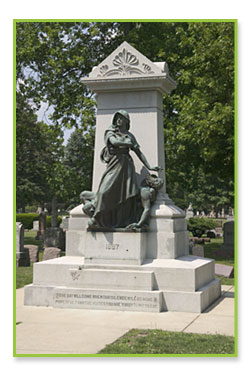His Father's Namesake
High School: Grades 9–12
Story
Page: 1 | 2 | 3 | 4 | 5 | 6 | 7
All Albert Jr. could remember about the subsequent trial and his father's time in jail was that he and his mother and sister could on occasion go to visit him in his jail cell. When no others were around, Albert Jr. was able to drink in the fatherly affection and love that he so longed for. In Albert Jr.'s now seven-year old mind, there was only right and wrong. As he nestled into his father's neck he asked him, "We left Haymarket before the riot. Why are you on trial for killing that man?"
His father stroked his son's hair and said, "Many people think I helped to incite the riot because I believe that the way things are now is unfair, and I am not afraid to stand up and say it. Why do the people who do all the work in the factories make no money and toil in dangerous conditions while the people who own the factories have lots of money and are safe?" The explanation of the evils of capitalism did nothing to soothe Albert Jr. All he could understand was that his father might be hanged for the murder of a man named Officer Matthias Degan, whom Parsons had never even met. Through the eyes of Albert Jr., that was simply wrong.
The public, however, who had put Parsons and seven other anarchists on trial, saw nothing wrong in sentencing these defendants to the gallows. A paranoid public was afraid of the anarchist and socialist rhetoric that fueled workers' strikes and the Haymarket Affair. This paranoia had tainted the trial and its outcome. A thousand candidates for jurors were questioned and most admitted they were unable to presume the innocence of the anarchists on trial. As Albert Jr. grew into a young man, he understood that he had been correct when he was seven—the trial and his father's hanging were wrong, a horrible travesty of justice. Illinois Governor John Peter Altgeld verified this belief with his pardon of the accused in 1893.
Now twelve years later, Albert wanted and hoped to make his way in the world. Whom did he have to help him? While other young men had their fathers to guide them into their adult life, or fathers that would listen to and comment gently on their son's new and different opinions about the world, Albert only had the memories of a seven-year-old and his father's written words. He read them over and over again, searching for some answers, for love, for understanding, for guidance. But he could never find answers. The pride that he had once felt as a young boy had vanished. Upon reading his father's Pittsburgh Manifesto, he was always left with the same uncertain feelings. Did his father really advocate violence as a way to change things? The manifesto stated: "Destruction of the existing class rule, by all means i.e., energetic, relentless, revolutionary and international action." What did this tell him to do? Rise up against the government only to be prosecuted and hanged? On the other hand, there was the letter his father had written to him and his sister before his hanging: "As I write this word I blot your names with a tear. We will never meet again. Oh my children, how deeply your Papa loves you. We show our love by living for our loved ones. We also prove our love by dying, when necessary, for them." At this point in the letter, Albert Jr. always stopped. He did not think he could ever understand how or why his father said he had died for him; if his father wanted to demonstrate his love, he should have stayed in hiding and then sent for his family. Instead his father willingly came out of hiding and turned himself in on the first day of the trial! Albert Jr. came to realize that the courtroom was just another soapbox for his father. Moments before he was hung, Parsons exclaimed, "Let the voice of the people be heard!" Albert Jr. came to understand that his father believed he was dying so the oppressed worker could have a voice. Albert Parsons might have believed that in being hanged he proved a point, but for Albert Jr. it only proved that his father's cause was more important than the son he left behind.
Downloads (pdf)

